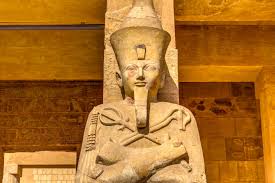Historians have studied the origin of the different books of the Bible, but seem not to have investigated the origin of the idea that these are sacred nor what this term originally meant. However, when want a good understanding of these books, we must know what their authors thought about them.
While today we assume that a sacred book tells the truth, sacred has the same origin as secret: both words come from the Latin verb segregare. Our ancestors called that part of the temple that only the high priest could enter sacred, because it had been segregated (separated) from the rest. Since what has been segregated conceals something from others, they associated the concepts sacred and secret with each other. Therefore, when they later elaborated stories that held secrets, they also called them sacred, as well as the books in which they were later written down. The word religion, which comes from the Latin verb legere, or ligare, which originally meant to unite and later to read, refers to reading sacred scriptures over and over again – rereading them – in order to discover their secrets.
The fact that an exhaustive study of the genealogies enables us to discover several secrets – the most relevant one refers to an enigma at the beginning of the New Testament which, many centuries ago, made people assume that Jesus was born of a virgin, but today reveals who was his father – demonstrates that it indeed makes sense to associate sacred with secret, and religion with the re-reading of sacred books.
Because of the big difference, not only between supposing that a sacred book guards secrets and supposing that it tells the truth, but also between associating religion with a search and associating it with indoctrination, we can assume that those who wrote those books were very different from those that today interpret them.
While someone who considers that the Bible guards secrets demonstrates humility, since he accepts that it contains ideas that he does not yet understand, someone who claims to understand the Bible – which is something religious authorities do – demonstrates his arrogance. And just as wisdom and humility go together, so do ignorance and arrogance: only someone who recognizes his ignorance about certain ideas can later on improve his understanding of them.
In my opinion, the historians who investigated the origin of the Gospels made the mistake of assuming that they are mere testimonies. That they may have been written to attract the pagans to a new form of monotheism is not something they seem to take into consideration.
The fact that the early Christians were vegetarians – Rm14: 21 – and believed in reincarnation, suggests that the gospels were the work of the Essenes. These people studied all the different religions and teachings (the ancient Chaldeans, Zoroaster, Hermes Trismegistus, etc.) to extract from them the great scientific principles. Since they worked diligently in secret for the triumph of light over the darkness of the human mind, it makes sense to assume that Jesus was raised among them. It is logical that the messiah, the person who will restore harmony on earth, recognizes that all religions and philosophies help to understand the true nature of humanity and the universe.
Although Jesus did not restore harmony on earth, Christians consider him the messiah. This idea makes only sense when we assume that his Second Coming – a reincarnation of him – will finish the work begun by him.
The fact that the Essenes kept their knowledge secret makes that we can associate them with Gnosticism, with the Kabbalah and with Freemasonry. The word gnosis is Greek and means knowledge. Since the Church has considered that Gnosticism is a heresy, it is often associated with secret knowledge.
Since ancient Hebrew only recognized consonants, and also the first alphabet did so, we can wonder whether perhaps in all languages words with the same combination of consonants have something in common with each other. This is the case of the Greek words gnosis and Genesis.
While this first book of the Bible tells us that our ancestors lived in harmony, and put an end to it after eating a forbidden fruit, the last book of the Bible associates the Second Coming of Jesus with a revelation – apocalypse means revelation – because it assumes that by revealing why we have conflicts Jesus’ Second Coming will restore harmony on earth.
#BrunoLernout – secretsinthebible.com

